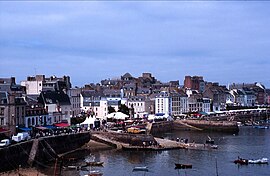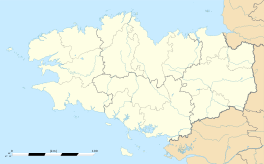Douarnenez
| Douarnenez | ||
|---|---|---|

Seafront of Douarnenez
|
||
|
||
| Coordinates: 48°05′34″N 4°19′45″W / 48.0928°N 4.3292°WCoordinates: 48°05′34″N 4°19′45″W / 48.0928°N 4.3292°W | ||
| Country | France | |
| Region | Brittany | |
| Department | Finistère | |
| Arrondissement | Quimper | |
| Canton | Douarnenez | |
| Intercommunality | Pays de Douarnenez | |
| Government | ||
| • Mayor (2014–2020) | Philippe Paul (UMP) | |
| Area1 | 24.94 km2 (9.63 sq mi) | |
| Population (2008)2 | 15,066 | |
| • Density | 600/km2 (1,600/sq mi) | |
| Time zone | CET (UTC+1) | |
| • Summer (DST) | CEST (UTC+2) | |
| INSEE/Postal code | 29046 / 29100 | |
| Elevation | 0–85 m (0–279 ft) | |
|
1 French Land Register data, which excludes lakes, ponds, glaciers > 1 km² (0.386 sq mi or 247 acres) and river estuaries. 2Population without double counting: residents of multiple communes (e.g., students and military personnel) only counted once. |
||
1 French Land Register data, which excludes lakes, ponds, glaciers > 1 km² (0.386 sq mi or 247 acres) and river estuaries.
Douarnenez, (Breton: douar (land) an enez (the island) or land of the island), is a commune in the Finistère department of Brittany in north-western France.
It is located at the mouth of the Pouldavid River, an estuary on the southern shore of Douarnenez Bay in the Atlantic Ocean, 25 kilometres (16 mi) north-west of Quimper. The population in 2008 was 15,066. It has declined since the mid-20th century because of jobs lost from declines in the fishing industry. But it still has fish canning facilities (sardines and mackerel) although sardine fishing, for which the town became famous, has fallen off in recent years.
Douarnenez has a growing tourist industry, with numerous visitors attracted annually to its pleasant location and warm climate, and also because of its marinas, maritime museum, regattas and sandy beaches. The island of Tristan off Douarnenez can be reached by foot at low tide. It is linked to the legend of Tristan and Iseult from the times of King Arthur.
The legendary city of Ys, of Breton folklore, is believed to lie beneath Douarnenez Bay. The port is also associated with the Arthurian medieval story of Tristan, lover of Iseult, for whom Tristan Island is named. The island was originally named St Tutuarn Island after the priory founded there in the 12th century. Douarnenez has several 16th and 17th-century churches, including the Church of Ploaré, which has a Gothic steeple (1548–86), and the chapels of Sainte-Croix, Sainte-Hélène, and Saint-Michel.
...
Wikipedia



